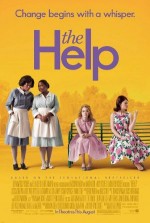The Help

Mississippi consisted of two worlds in the 1960s (and, many would say, still today): the free-to-do-as-they-please whites, be they rich, poor, or in-between, and blacks struggling against centuries of bigotry to reach the same level. That’s a pretty simple explanation for something as complex as life, but the truth is still in there. The movie version of 1960s Mississippi is pretty much the same (simpleness included), with the extra addition of a young white boy or girl (Emma Stone, here) to bridge the gap.
To be fair, that is an extremely cynical reading of Tate Taylor‘s light adaptation of The Help. On the other hand, no one ever lost money betting against Hollywood’s capacity for cynicism. The Help is ultimately about racism in the 1960s, and writer-director Taylor takes that seriously, but because he’s making a light drama, there is a limit into how far into the subject he can get. And because he is making a light drama attempting to be pushed to a wide audience, he’s stuck with a main character more at home in a Lifetime movie than a serious drama about bigotry.
It helps that Stone is an extremely charming actress who can emote without scenery-chewing. Eugenia “Skeeter” Phelan, in brief, comes across like a checklist young-adult novel heroine: smart, sassy, has a dream of being an editor and novelist in New York, looking for someone to love her despite not being a brainless housewife like so many of her friends. It is to Taylor and Stone’s credit that they’re able to get more than that out of Skeeter, but it’s still impossible to hide the fact that she is actually superfluous to the story, and the more time spent on her conflict with her controlling mother or her equally-controlling childhood friend Hilly (Bryce Dallas Howard) is time ill-spent.
The real focus of the film is Aibileen (Viola Davis), a long-time maid and the first person to open up to Skeeter when she decides to write a book about life in Jackson from the point of view of the help. It is through Aibileen, and eventually fellow maid Minny‘s (Octavia Spencer), eyes that the reality of life for the black community in Jackson plays out and any time spent away from that can’t help but like a detour away from the point.
Aibileen represents the conflicted, intertwined reality of white and black communities in the south that The Help wants to be about. She has great anger and sadness in her heart, due to the recent death of her son and the general lack of notice his passing took in the larger world. At the same time, she can’t help but love the fourteen children she has raised from infancy to adulthood. But even though she does, that love is tempered by the bitter knowledge that many of them will grow up to be spiteful and mean-spirited like Hilly, who regularly spreads stories of thievery about former maids to ensure they can’t find other work. Just because she can.
It’s in the simple showcasing of that sort of truth — Hilly’s concern about her maids using the inside bathroom because of a fear of catching disease, Aibileen and friend’s real concerns about violence coloring their approach to everyday life — that The Help hits the level it wants to.
The rest of the time, though, it is far too timid to do what it claims it wants to do. Which doesn’t mean unending scenes of violence and depredation, or a re-enactment of lynchings are necessary; understatement in the right hands is far stronger than relentless grist. But The Help doesn’t shy away from that sort of thing out of understatement so much as a desire to remain light, easily-digested entertainment. Which explains the frequent discursions to whatever problems Skeeter is working through but doesn’t help the message the film wants to present, as it teeters from people getting shot in the street to the concerns of a ditzy society outcast from the sticks (Jessica Chastain). The disconnect becomes particularly noticeable during the long, dragged-out conclusion that allows everyone and their brother to take a shot at Hilly.
The end result is entertaining but difficult to digest, attempting to address a serious subject with homilies and wrap it up in young-woman pseudo-drama. Despite the skill of the actresses involved and decent direction from Taylor, the intertwined ensemble story The Help is going for never fully materializes. In its place we get a harmless story about a young woman finding herself amidst her realization that the South is an extremely racist society. It’s not bad and will probably hit its target audience just as directed, but after all they’ve gone through, The Help deserves better.
Cast: Emma Stone as Eugenia “Skeeter” Phelan; Bryce Dallas Howard as Hilly Holbrook; Viola Davis as Aibileen Clark; Octavia Spencer as Minny Jackson; Jessica Chastain as Celia Foote; Allison Janney as Charlotte Phelan; Sissy Spacek as Mrs. Walters; Ahna O’Reilly as Elizabeth Leefolt; Chris Lowell as Stuart Whitworth; Cicely Tyson as Constantine Bates.



Leave a Reply